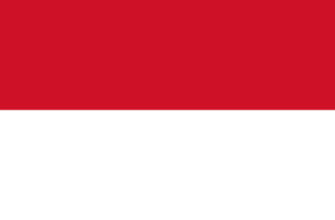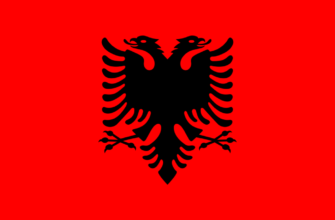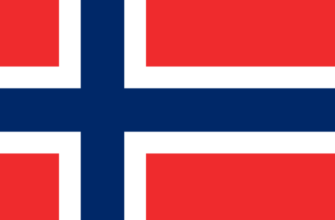The Republic of Moldova is a state located in the southeastern part of Europe.
This is what the modern flag of Moldova looks like:

History of the flag
On the territory of modern Moldova in the 14-19 centuries there was a Moldavian principality.
After the decline of the Golden Horde, the principality at first fell into dependence on Hungary, but in the middle of the 14th century it became independent. In those times, the main symbol for the Moldavians was a bull’s head and the red color prevailed over the other colors. Perhaps for this reason, one of the first surviving images of the flag is a red cloth with the head of a bull (auroch).

By the beginning of the 17th century, the period of reign of the principality of Imeria Grave, used a banner with a similar image of an auroch head, which is placed in a ring of white with a cross on top. The banner itself was bordered with a band of yellow color.

In the 19th century, the flag of the Principality of Moldavia changed its basic coloring from red to blue. In particular, between 1834 and 1859, the symbol was a blue cloth with three eight-pointed stars depicted as a triangle on a red background in the upper left corner. On the right side of the flag was the coat of arms of the Principality, on which the central figure was a bull’s head.

In 1859, this version of the flag was modified: the three stars are depicted in a single row, and instead of the coat of arms remained only the head of a bull.

Parallel to the existence of the Moldavian Principality, there was another formation on the territory of the Russian Empire — the Bessarabian Province. The Democratic Republic, created on its basis, had several variants of the flag:
- The first consisted of two colors (red and blue) and a bull’s head;

- the second one was tricolor and had two kinds — one with the inscription «Democratic and Independent Moldovan Republic» and the other with the inscription «Council of the Region»;


- The third was also tricolor with the inscription «RM» — Republic of Moldova.

After becoming part of Romania, the flag of the latter became the official flag until the Soviet period of history.
With the formation of the USSR, Moldova in the initial period was part of it on the rights of an autonomous entity. Since 1925, Moldova received its official flag, which lasted until 1938.

The variants of the official symbols of Moldova in the period 1938-1940 were similar to each other with the only difference that the first variant used Ukrainian and Latin inscriptions.

In the second version, the Latin alphabet was replaced by the Moldovan language.

In 1940, after the territorial changes in the Soviet Union, the Moldavian ASSR was abolished, part of its territory was annexed to the Odessa region, and the other part, together with the annexed lands, became the basis of the Moldavian SSR. A year later the republic had its own flag.

In 1952 it was replaced by a single type symbol, which were the other republics of the USSR.

In the 1990s, at the turn of the collapse of the Soviet Union, the Moldovan Republic replaced the previous flag with a tricolor with historical colors.

At the same time, it was proposed to use other prototypes: with the coat of arms of the Moldavian SSR and a bull’s head, but never approved.


The final version of the national flag was adopted in November 1990.
Description
The Moldovan flag is a rectangular shape, the sides of which relate to each other as 1 to 2. The tricolor consists of equal stripes depicted vertically. The stripe closer to the staff is of dark blue color, followed by a yellow stripe and the stripe opposite the staff is of red color.
In the center of the yellow part, the coat of arms of the Republic of Moldova is inscribed at equal distance from all edges.
It has the form of a shield placed on the chest of an eagle. In his beak is held a cross of golden color. In its talons are the symbols of power and peace: a golden scepter and a green olive branch.
The shield of the coat of arms has a top and a bottom, which are red and blue, respectively. In the center of the shield a gold coloured bison head is depicted with an eight pointed star between the horns. On the right side of the nostril is a five-petalled rose, and on the left is an inverted crescent. The width of the coat of arms and the length of the cloth have a ratio of 1 to 5.
Flag colors
Three main colors are used on the Moldovan flag: blue, yellow and red. In addition to these, brown and green are used to color the coat of arms.
Meaning of colors and flag symbol
The official symbol of the Republic of Moldova has a heraldic meaning of the colors used: blue is the color of the sky and the desire for peace, yellow represents the sun and the wheat fields, and red symbolizes the blood spilled for the country.
The eagle, which holds the cross with its beak, stands for the Christian faith and is reminiscent of the Roman roots of the inhabitants. The olive branch represents peace and justice, and the scepter represents the independent status of the state.
Other Flags
The first persons of the state of Moldova have banners, which differ only in the main background of the cloth:
- The presidential one is purple;

- The premier one is blue;

- The Speaker of Parliament is red.

In addition, several governmental organizations also have their flags approved by decisions of parliament or government. These include:
- Armed Forces;

- Department of Civil Defense and Emergencies;

- Customs;

- Border Service;

- Information and Security Service;

- Main State Inspectorate for Technical Supervision of Hazardous Production Facilities.

For your information! The present territory of Moldova includes the autonomous formation Gagauzia with its symbol and the unrecognized state — the Pridnestrovian Moldavian Republic. The flag of PMR is the same as that of Moldavian SSR.

Interesting facts about the flag
- Prior to 2010, the front and back had no mirror image. In particular, the coat of arms was depicted only on the front side. In 2010, the Law on the State Flag determined that the coat of arms is displayed on both the front and back of the cloth.


- The national flag of Moldova has its historical basis — the tricolor was adopted at the time of the revolution in France (1848). The imitation of the French symbol was supposed to indicate that the people held republican views. The difference between the two cloths was that the white color on the flag of France was replaced by yellow.
- The Moldovan flag has a coincidence with the Romanian flag, which has the priority right to this type of symbol. The difference is that the Moldovan version has a coat of arms, and besides the aspect ratio is the same as the Soviet version — 1 to 2, while the Romanian one — 2 to 3, as in most countries of the world. There are also similarities with the flags of Andorra and Chad. They differ again in the proportions of the sides, and in the case of Andorra also by the fact that the latter uses the coat of arms of its country.
General information about Moldova
| Official language | Moldovan, Romanian |
| Capital | Chisinau |
| Territory | 33 846 km² |
| Population | 3 550 900 people |
| Currency | Moldovan leu (MDL, code 498) |
| Phone Code | +373 |










Комментарий от имени Амира Богомоловой:
Как молдаванка, я горжусь нашим флагом и тем, что он символизирует нашу культуру и идентичность. Три цвета – синий, желтый и красный – не только яркие, но и полны смысла. Синий олицетворяет небо и надежду, желтый – наше богатство и урожай, а красный – нашу историю борьбы и страсти. Флаг напоминает нам о наших традициях и объединяет людей, живущих как в Молдове, так и за ее пределами. Я надеюсь, что каждый молдаванин будет гордиться своим флагом и тем, что он представляет!
От Сандры (женщина): Полностью согласна. На первом концерте молдавской общины я увидела флаг и сразу почувствовала единство. Для меня это не просто цвета, а бренд и эмоциональный якорь, связывающий диаспору с домом.
Полностью согласна — символика флага важна. Как молдаванка в диаспоре, помню, как на празднике вывесили триколор: сразу появилось чувство общности. Для меня это не просто цвета, а код идентичности и история, которую передаю детям.
Как парень из многонациональной семьи, я тоже понимаю важность символов. У нас дома флаг всегда был не просто полотнищем, а напоминанием о корнях и ценностях. Он помогает сохранять связь с культурой, даже если жизнь уносит вдалеке. Твой комментарий очень вдохновляет!
I remember the first time I saw the Moldovan flag waving at a cultural festival. It was so vibrant and full of life! Seeing all the people celebrating their heritage made me appreciate how flags can unite communities. It reminded me of the importance of roots and traditions.
I totally get that! The first time I saw the Scottish flag at a festival, it gave me chills. The energy of the crowd and the pride everyone felt really showcased the strength of our roots. It’s amazing how flags can spark such a sense of belonging and community!
I remember visiting Moldova and seeing the flag everywhere. It’s fascinating how the blue, yellow, and red colors represent unity and history. I even got a small flag as a souvenir. It reminded me of the country’s rich culture and the warmth of its people. Such a special place!
I remember visiting Moldova a few years back and seeing the flag everywhere. It has such vibrant colors and the coat of arms is really striking. I loved learning about its history and the meaning behind each part. It made me appreciate the country’s culture even more!
I remember when I visited Moldova and saw their flag waving proudly. It filled me with pride and excitement! The vibrant colors really represent the spirit of the country. I’m grateful for that experience, as it gave me a deeper appreciation for their culture and heritage.
I remember the first time I saw the Moldovan flag during a cultural festival. The vibrant colors stood out, and it reminded me of my trip to Chișinău. The rich history and warmth of the people truly made it special. Flags like that tell so many stories!
As a woman who traveled through Eastern Europe, I remember spotting the Moldovan flag flying proudly in a small village. It was vibrant and full of history, just like the people there. That flag symbolizes resilience—I always associate it with warm, welcoming vibes from my trip.
Seeing the Moldovan flag always reminds me of that time I got lost in Chișinău but found my way thanks to a kind local who pointed me out using the flag on a building. It’s amazing how symbols like flags connect us and tell stories about a place.